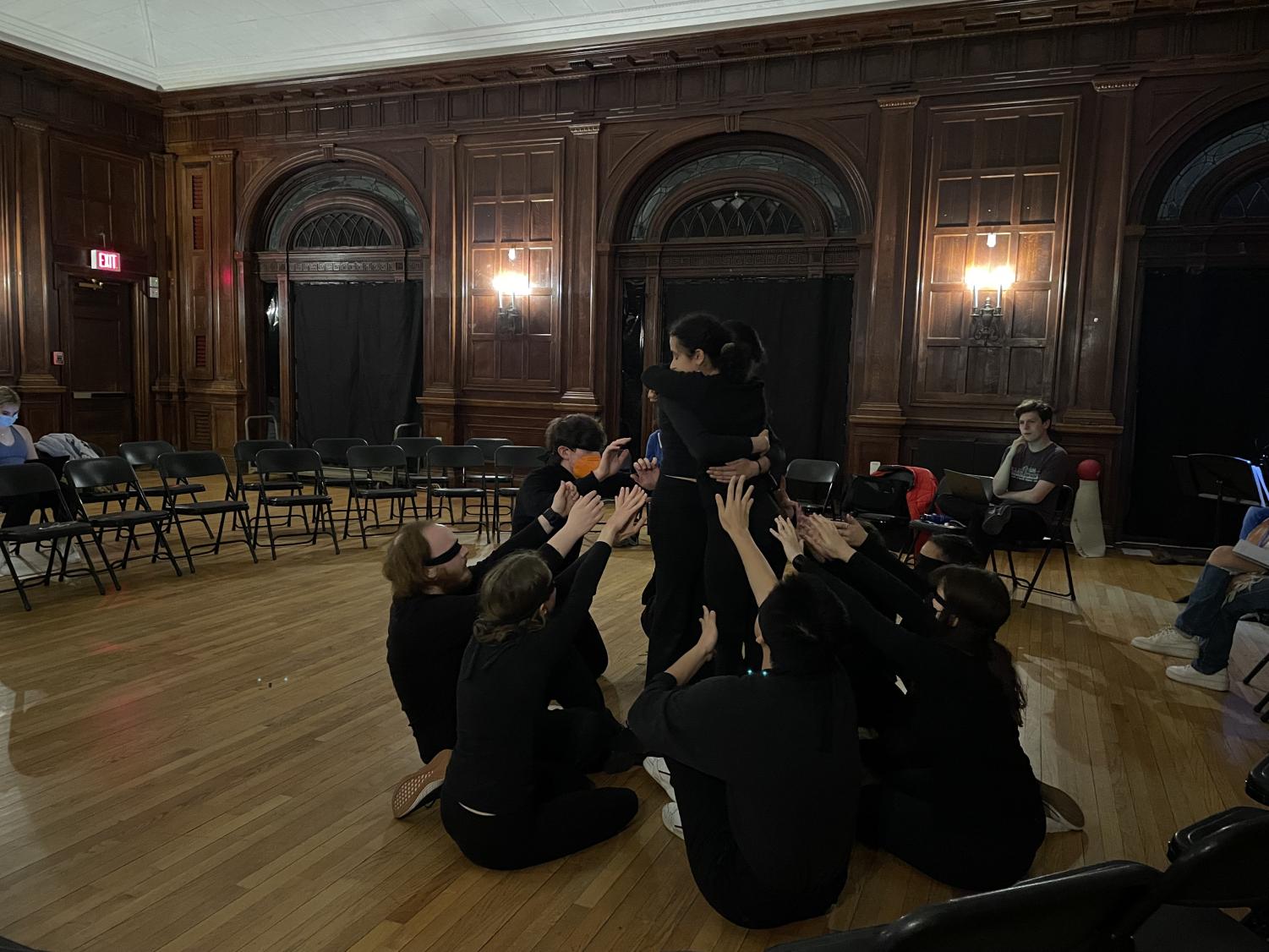Cap & Bells’ Biophilia
April 27, 2022

When Ryan Crants ’24 reached out to Vassar first-year and playwright Ella Talerico, Crants’ former high school classmate, to see if she had material for a Cap & Bells production, he was in luck. She was in the process of writing Biophilia, a play of short vignettes and monologues that she calls her “love letter to living” in her program note. Crants, along with co-director Sophia Rothman ’25, directed the show in Currier Ballroom on April 15 -17.
The scenes follow a mother and child as they observe dancers portraying abstract components of humanity such as mind, memory, and soul. Inspired by the hurried technique of impressionist artists, Talerico created Biophilia by writing in quick bursts of inspiration, focusing on eliciting a range of emotions in her audience like joy, distress, loneliness, and solace. “[In] other things I’ve written, I’ve been super intentional about telling a direct narrative story and focusing on a specific character’s psyche,” she said in an interview with the Record. “Biophilia was more about … how we collectively experience life.”
She added that the play features a discussion of different ways through life. “[It] touches on aging, sense, thought, the nature of memory and trauma, different life paths colliding, and the eternal struggle to find joy and inner peace,” she said.
The two directors worked to capture Talerico’s vision. “It’s a distilled version of life, in all of its joys and in all of its sadness and it takes the audience through the fluxuations between each of those,” he said. “What makes life beautiful is that it has both: It’s not the love of all the beautiful things in life, it’s the love of all of life. The hardships together with the moments of triumph.”
With a short rehearsal time, and with such abstract themes in mind, Crants and Rothman prioritized conveying Talerico’s themes to the actors. “The most important thing was for the actors to understand what’s happening in the scenes that they are in, in terms of being able to convey that to the audience,” Crants said. “The most important thing was for the actors to understand what’s happening in the scenes that they are in, in terms of being able to convey that to the audience.”
The scenes varied greatly in their modes of expression. Some involved silent, contemporary dance sequences choreographed by Caroline Morrissey ’25, and others focused on quick exchanges of repeated or slightly differentiated words and phrases among the ensemble. The child, portrayed by Andrew Nachamkin ’24, gave three impassioned monologues about life throughout the play, jumping to the stage to give his changing impressions.
From an audience perspective, the play was not always easy to understand, but Crants said he expected there to be some confusion. “I don’t think we went into this thinking, ‘The audience is going to get every single nuance that we worked out in rehearsal,’” he said. “But for the audience to get that emotional response — to go through the emotions we want them to go through, to understand the thesis statement of the play — is very important.”
Crants said collaboration was an important aspect of the rehearsal process. “It’s very much a team effort, when the actor understands they can convey a little bit through their tone and their voice and their physicality,” Crants said. He went on to mention how musical directors Michael Fallon ’24 and Tasan Smith-Grady ’24 and percussionist Noah Poll ’24 collaborated to create the emotional atmosphere of the performances. “They provide a lot of the mood and tone that guides the audience,” he said.
For Morrissey, portraying Talerico’s vision through choreography was especially thrilling given the uniqueness of this production. “It’s exciting that this is the premiere of this show — no one has ever done this show before — so it’s exciting that all of the interpretations I’m making are the first that anyone is making about the show,” she said.
Speaking to her reasoning for writing this play, Talerico commented on the universality of her play’s message. “To a certain extent, you don’t have control over what happens over what happens in your life … but you still have to believe that there is an inherent light and hope that stays inside of you — basically don’t give up,” she said. “I think that that is an eternal message that can never stop being delivered.”








